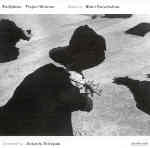Eleni Karaindrou is one of today’s most noted Greek composers, and her longtime association with ECM confirms her international reputation. But whereas her previous recordings explored her scores for films by Theo Angelopoulos, this recording marks new ground. It’s an album of music written for the theatre: Euripides’ Trojan Women, presented here in an excellent, powerfully simple modern-Greek translation by K.X. Myris. (Modern demotic Greek and the ancient language are quite distinct from each other.) This performance was recorded at the world-famous ancient theatre of Epidaurus, a sonically stellar location. (Though there were critically lauded performances of this version performed throughout Greece and Cyprus, there are no current plans to tour the play internationally; an unfortunate call, judging by the strengths of the reviews in Greece.)
Karaindrou notes that the play, first performed in 415 B.C., has a theme that resonates strongly in the 21st century: the cruelties and ultimate folly of war. Her settings, as stark and as sharply defined as the landscape of her homeland, will be instantly recognizable to anyone who has heard her previous work. Often, only two or three instruments are heard at once, limning the contours of her writing in much the same way that classical theatre stagings often only suggest a setting. Here, it’s a striking musical technique.
Karaindrou, who founded Greece’s Laboratory for Traditional Instrument Players in 1976, uses an instrumentation that itself is a powerful statement, particularly to those listeners who will instantly understand her message. Forfeiting a Western ensemble, she employs an array of instruments that are found throughout Asia Minor, the Middle East, and the Balkans: the stringed, bowed lyra, quite like the Turkish and Persian kemencheh; the lauto (a lute); the husky ney flute; an outi (the Greek name for the oud); the kanonaki zither; the santouri dulcimer; a harp; and the bendir and daouli drums. These instruments, or close relatives to them, are common among many peoples–among them Armenians, Jews, Greeks of Asia Minor, Kurds, and Afghans–all of whom have suffered tremendously in the 20th century.
To this battery Karaindrou adds a chorus and a soprano soloist, Veronika Iliopoulou. Iliopoulou’s solos are the recording’s one misstep: her tremulous, pinched, self-conscious singing breaks the magical spell Karaindrou casts, but this faltering is easily overlooked. The instrumentalists (none of them previously known to me) acquit themselves nicely, but it’s Karaindrou’s overall effect rather than individual contributions that makes this recording so memorable. The booklet’s many pictures give a sense of director Antonis Antypas’ staging so that even if we can’t experience this production live, we have some sense that we have witnessed it.
































